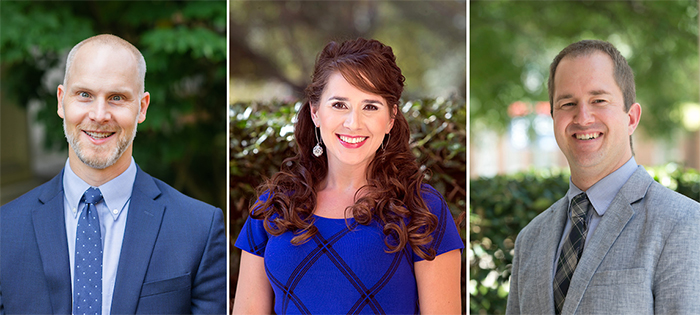
Samford University professors are using significant recent grants to enrich their teaching and research about faith traditions.
Earlier this academic year, history professor Anthony Minnema earned a Council for Christian Colleges and Universities (CCCU) and Interfaith Youth Core (IFYC) grant that encourages faculty to integrate elements of interfaith engagement inside and outside the classroom with the goal of increasing religious literacy broadly and fostering civic religious pluralism.
The grant was awarded just in time for Minnema to use the CCCU/IFYC Christian Leadership in a Multifaith World curriculum to enrich his Foundations of Islamic Civilizations course in the fall. “When I last taught this course, several evaluations indicated that students wanted more Muslim voices in the class,” Minnema said. The grant requires faculty to develop exercises that introduce those voices, and although COVID-19 prevented face-to-face dialogue, Minnema found a solution. “I worked with a group called Scriptural Reasoning, which facilitates conversations between Christian and Muslim students regarding their respective scriptural traditions,” he said. Meeting via Zoom, students of the different faith traditions presented and discussed passages of scripture from their traditions.
Minnema said the grant locates Christian foundations for interfaith dialogue in Christian scriptures, such as the parable of the Good Samaritan and the centrality of love in 1 Corinthians 13. “It also gives space for students to ask big questions that might arise when they engage in interfaith dialogue, including sensitive matters of religious difference,” he said.
The Lost Art of Lament
School of the Arts professor Emily Andrews and religion professor Will Kynes recently earned a 2022 Vital Worship Grant, presented by the Calvin Institute of Christian Worship, to explore what they describe as the “lost art” of lament. Only sixteen teacher-scholars were chosen for the grants, which provide up to $18,000 in support of projects that show promise to serve worshiping communities by strengthening Christian public worship practices.
Kynes said that although the idea of complaining to God, and even arguing with God is common in scripture, some modern Western churches have directed worship more in the direction of enjoyment. “Recent events, however, have provided an opportunity for the church to think anew about the role of lament in worship, along with other practices that respond to suffering with authenticity, sincerity and vulnerability,” Kynes said.
Through their project, Andrews and Kynes aim to learn from, and with, an ecumenical group of churches unfamiliar with the practice of corporate lament, to gather the most important questions and pastoral concerns related to practicing corporate lament, and to develop practices for retrieving and employing lament in worship. The pair also plan to develop an online resource to share their lament practices with one another and the broader public. “Because we especially aim to support this work among congregations who may not be well-versed in the forms and practices of lament or have readily available resources for it within their own traditions and networks, we believe our work can sit as an extra-ecclesial resource-arm, able to assist congregations to approach related questions and practices at each exploratory stage,” Andrews said.
